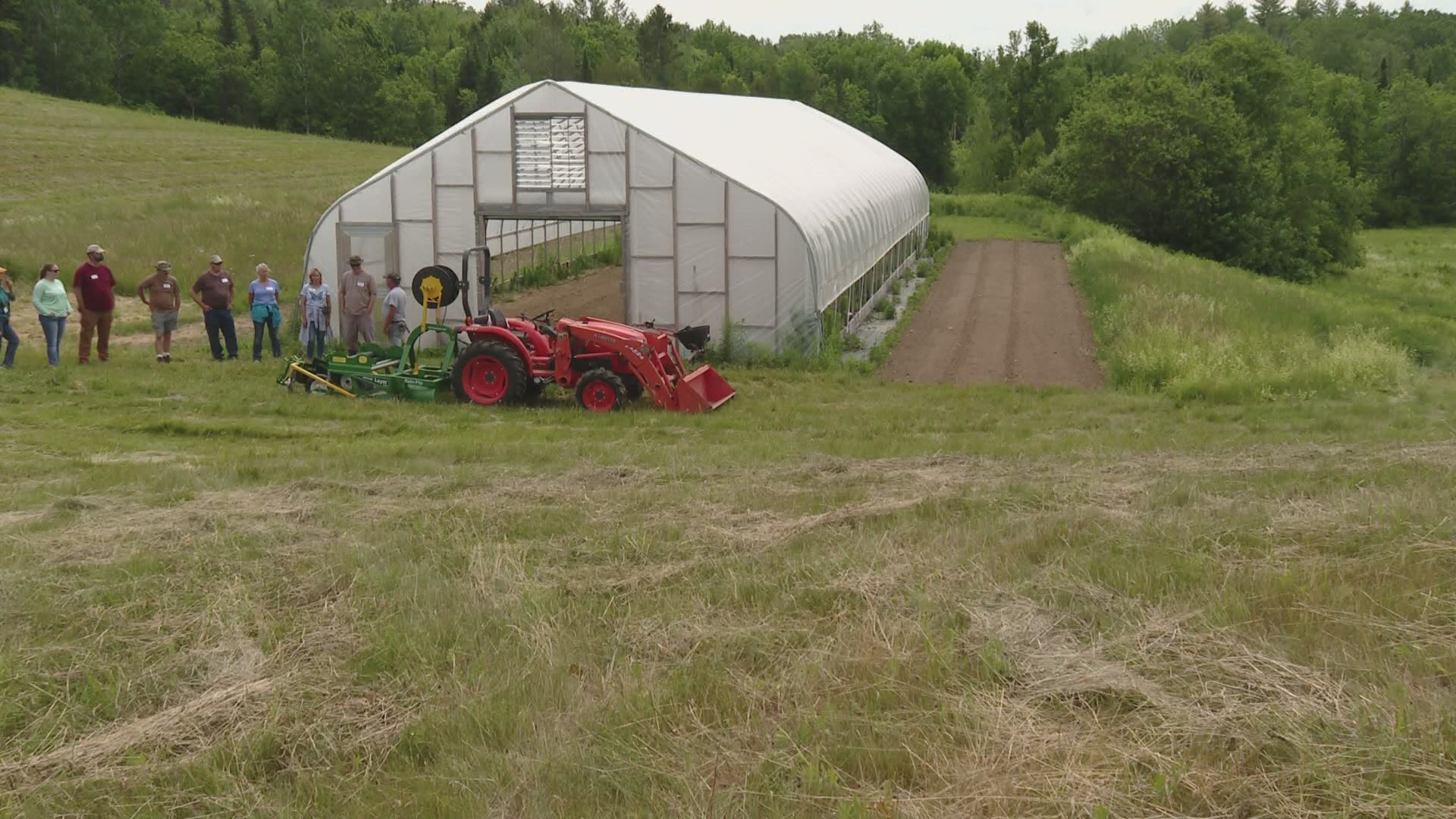MONROE, Maine — Six years ago, Tim and Anne Devin stepped away from the Marines and on to a 72 acre farm in Monroe, knowing almost nothing about farming. That did not deter them one bit.
"A lot of the characteristics – the things that we’ve been trained on in the military like resilience, teamwork, creativity, taking the initiative, those are all types of things that really come in to play when you’re farming," Anne said.
Anne makes it clear that learning to farm comes with plenty of challenges.
"Perseverance is a huge one. You don’t always see the fruits of your labor, and things fail, and the water doesn’t work, or there’s a drought, heavy winds blow down one of your high tunnels ..." she said.
In her part-time work with Maine Agrability, a collaborative project dedicated to helping farmers, fishermen, and forest workers work safely and more productively, she saw some of the obstacles that veterans encounter when they transition from the military.
"[I] started working with veterans and as I started having more and more clients, it became apparent that a lot of the struggles were traumatic brain injury-related, PTSD, and depression-related, which made it really hard to do any planning. If you wanted to be a farmer you have to be able to plan," Anne said.
As Maine Agrability's veteran outreach coordinator, she first launched a program called “Educate to Cultivate” – teaching the basics of the business side of farming. It was so well received that the program grew to this – Boots 2 Bushels, a comprehensive, hands-on, nine-month program teaching veterans how to farm.
"I think for a lot of military folks it’s very common for us because we’re older as we come into this farming industry, you know, we think we’re smarter – we’re like, ‘Oh, we can figure it out.' So many veterans will jump into doing five to ten different enterprises on their farm and we were no exception. We had broilers for chickens, we did pigs, we had sheep, we had bees, we did maple syrup, we did the vegetables, we did fruit and we burned ourselves out. Now it’s just trying to figure out where that sweet spot is," Anne recalled.
And, helping others figure out their sweet spot. Boots 2 Bushels puts veterans who want to farm right in the field, learning about planting, soil conditions, and equipment. They start mid-winter and by May, they are at the farm, once a month, tackling a specific topic.
Tim Devin, or "Farmer Tim" as he is known, leads today's workshop. The topic: getting water to the crops, which is overwhelming unless someone who has done it shows you how to set up valves, figure out water pressure and flow, lay drip lines, and attach end caps.
Genee Gregory bought a 25-acre farm with her wife and is farming now. She took this course last year and is back to learn more. Her military experience left her with PTSD and a traumatic brain injury.
"Some of the things for farming are totally overwhelming once you get into them, it’s like a snake’s nest," Genee said. "So, being able to get a farm up and running, on your own, during a pandemic, was like … SO difficult! I don’t know if I would have given up, but I wouldn’t have gone up to the scale I have - and just learning this today? It’s simple, right? Now I feel confident to go home and actually put in my drip irrigation. So I am happy – so happy about that."
Marcel Montane is a Navy vet, and his wife retired from the Air Force. They bought a farm in Perham, about a half-hour northwest of Caribou. Part of what he’s taken away from this class is learning what not to do. "I think it’s important to start off small, obviously it’s gonna take a lot of time," he said.
Farmers really want to get plants in the ground, and the morning wrapped up using a piece of equipment called a Hatfield transplanter to get seedlings in the dirt. In minutes, they got a row of peppers planted and irrigated, thanks to the drip line.
Anne and Tim hope Boots 2 Bushels will give these veteran farmers the tools to translate military experience into farming success.
"It’s the plan of attack. You still have to plan your attack on how you’re going to grow everything and get things done," Genee said. "At first you’re like, ‘I’m gonna do maple, I’m gonna do bees, I’m gonna do everything – oh my goodness!' and then reality slaps you in the face and you’re still trying to figure out how to dig the ground up."
Now into their sixth growing season, having navigated all sorts of hurdles, Anne and Tim can share what they've learned, hoping to help other veterans learn from their mistakes.
"We by no stretch of the imagination are experts, but I know the experts now. I know who to reach out to whether it’s my peers in the farming community, or instructors from MOFGA, or instructors from University of Maine Cooperative Extension. Our whole lives have been about service. Now it’s about serving our community, there’s no better community for me – right now – than the veterans," Anne said.
The Boots 2 Bushels program is currently funded by grants. Anne is hoping to see programs like this take root across the country.
Click here to learn more about Maine Agrability. Click here to learn more about the Boots 2 Bushels program.

